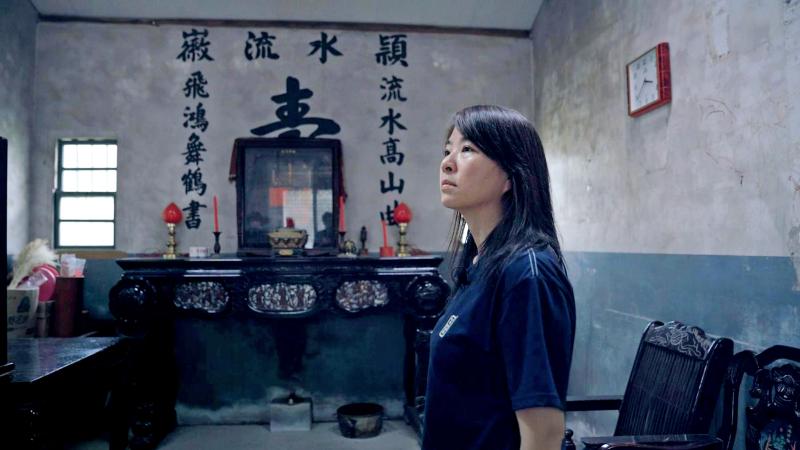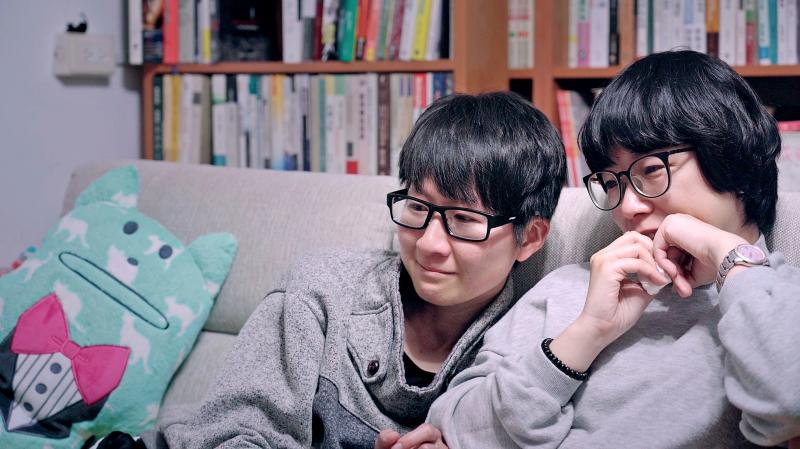There’s plenty of tears in this intimate, highly-emotional documentary about six female business owners on a street that’s not even shown on Google Maps. They all seem to harbor some past burden and the little shops seem to be their refuge, and director Yang Li-chou (楊力州) digs deep into their pain — but perhaps a bit too much as Love Without Clutching, Leave Without Guilt (愛別離苦) fixates on the sob factor and fails to tell a coherent story.
The tale of Lingtan Street (菱潭街) in Taoyuan’s Longtan District (龍潭) mirrors that of countless once-derelict areas in Taiwan: abandoned for 14 years, it went through a “cultural creative” revival and now hosts cute shops in the redone storefronts. Yang originally set out to tell this story of its rebirth, mostly speaking to men. However, the ideas of young people returning home and community revitalization didn’t excite him and he nearly abandoned the project. Yet the place kept drawing him back, and he finally decided to depict the lives of these resilient women who carry on despite business being virtually nonexistent, exacerbated by the pandemic.
The Chinese title refers to one of the eight great sufferings in Buddhism: the pain of being separated from the ones you love. Trinket store owner Momo came from a traditional Hakka household that discriminated against girls, yet she’s the one dealing with all sorts of family tragedy; bookstore owner Jia-hua wants to marry her lesbian partner; soapmaker Pei-pei’s ex-husband has barred her from seeing her son since he was an infant, but the now-teenaged boy secretly visits her at her shop.

Photo courtesy of Back Stage Studio
Yang’s film is pretty much a montage of these women’s stories, providing a glimpse into the buried inner world of ordinary women, and manages to unearth events and emotions from their past that speak to the common struggle of being a woman in a patriarchal society. This is much harder to film than just a story of the street’s revival, and it’s impressive that he got the subjects to candidly share with the public such personal stories.
Yang’s voice is often heard in the film, chatting with his subjects. In one scene, he shows Jia-hua and her partner Chen Miao footage of Jia-hua’s mother discussing her daughter’s sexuality. This is a subject Jia-hua has never broached with her mother, and she is moved to tears after watching it. For this reviewer, this is unnecessary interference in the subject’s life. Ethics aside, there is no need to create even more sentimentality when there is already more than enough. The cheesy montages of the subjects crying are overkill.
The colorful animated illustrations by Miss Charlie (查理小姐) are a nice touch, however, injecting some whimsy into the film.

Photo courtesy of Back Stage Studio
Overall, it feels like featuring six people is too much for its 77 minutes of running time, especially as Yang also includes day-to-day scenes of the street such as birthday parties and temple festivals. There’s obviously a few women whom Yang manages to get closer to, and it would have worked better to focus on them and flesh out their characters more.
Finally, the film fails to capitalize on what binds these women together: their persistence to remain in business on Lingtan Street, even when the meager profits aren’t enough to pay their bills. Failing to recruit a single student one month, piano teacher Chu-chun moonlights as a masseuse and cleaner to stay afloat.
So what does this place mean to them? What power does it hold over them? Of course there’s warmth and a sense of belonging here, as some of them are seen shopping, eating and watching the 2020 presidential election together. But there just could have been more to tie the characters directly back to the street, which was the original impetus for filming.

Photo courtesy of Back Stage Studio

One of the biggest sore spots in Taiwan’s historical friendship with the US came in 1979 when US president Jimmy Carter broke off formal diplomatic relations with Taiwan’s Republic of China (ROC) government so that the US could establish relations with the People’s Republic of China (PRC). Taiwan’s derecognition came purely at China’s insistence, and the US took the deal. Retired American diplomat John Tkacik, who for almost decade surrounding that schism, from 1974 to 1982, worked in embassies in Taipei and Beijing and at the Taiwan Desk in Washington DC, recently argued in the Taipei Times that “President Carter’s derecognition

This year will go down in the history books. Taiwan faces enormous turmoil and uncertainty in the coming months. Which political parties are in a good position to handle big changes? All of the main parties are beset with challenges. Taking stock, this column examined the Taiwan People’s Party (TPP) (“Huang Kuo-chang’s choking the life out of the TPP,” May 28, page 12), the Democratic Progressive Party (DPP) (“Challenges amid choppy waters for the DPP,” June 14, page 12) and the Chinese Nationalist Party (KMT) (“KMT struggles to seize opportunities as ‘interesting times’ loom,” June 20, page 11). Times like these can

June 23 to June 29 After capturing the walled city of Hsinchu on June 22, 1895, the Japanese hoped to quickly push south and seize control of Taiwan’s entire west coast — but their advance was stalled for more than a month. Not only did local Hakka fighters continue to cause them headaches, resistance forces even attempted to retake the city three times. “We had planned to occupy Anping (Tainan) and Takao (Kaohsiung) as soon as possible, but ever since we took Hsinchu, nearby bandits proclaiming to be ‘righteous people’ (義民) have been destroying train tracks and electrical cables, and gathering in villages

Dr. Y. Tony Yang, Associate Dean of Health Policy and Population Science at George Washington University, argued last week in a piece for the Taipei Times about former president Ma Ying-jeou (馬英九) leading a student delegation to the People’s Republic of China (PRC) that, “The real question is not whether Ma’s visit helps or hurts Taiwan — it is why Taiwan lacks a sophisticated, multi-track approach to one of the most complex geopolitical relationships in the world” (“Ma’s Visit, DPP’s Blind Spot,” June 18, page 8). Yang contends that the Democratic Progressive Party (DPP) has a blind spot: “By treating any